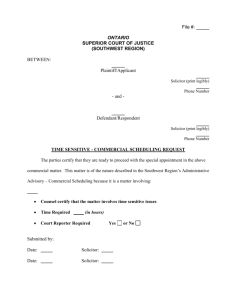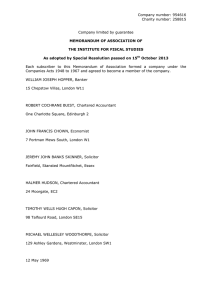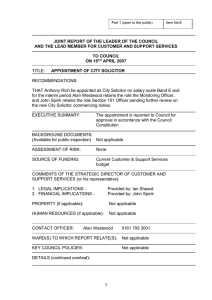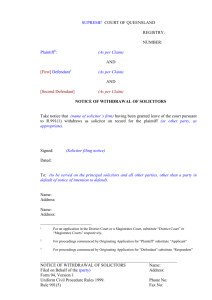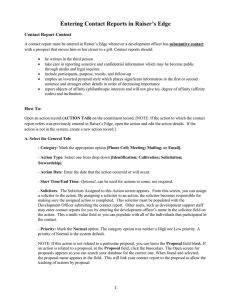Code for Completion by Post
advertisement
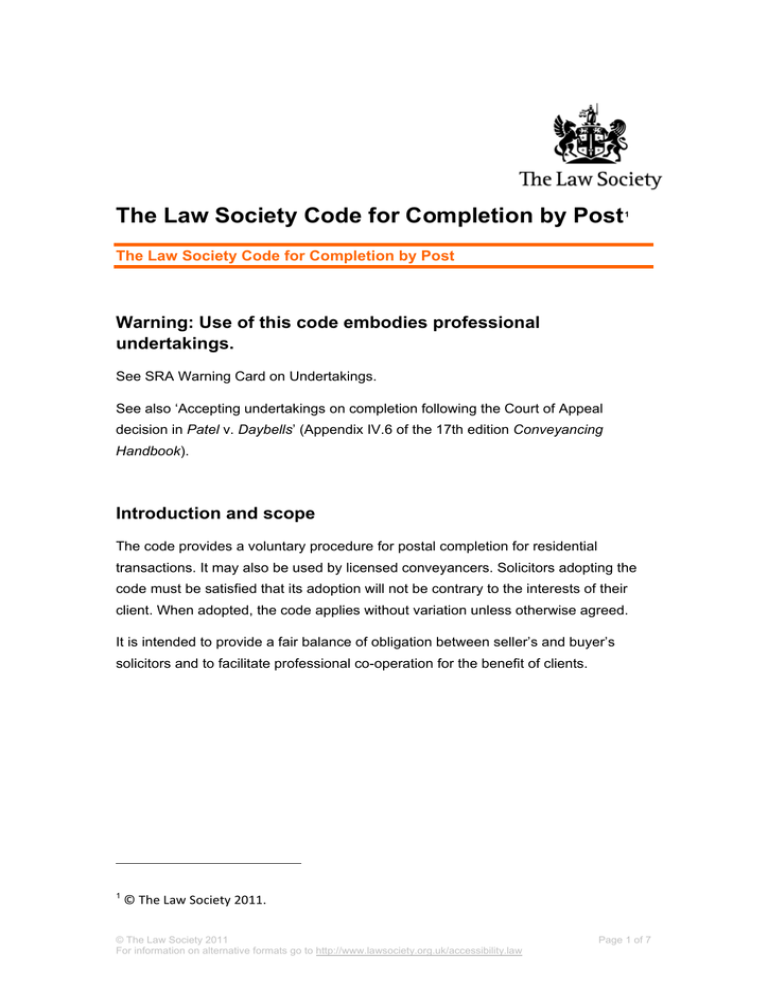
The Law Society Code for Completion by Post 1 The Law Society Code for Completion by Post Warning: Use of this code embodies professional undertakings. See SRA Warning Card on Undertakings. See also ‘Accepting undertakings on completion following the Court of Appeal decision in Patel v. Daybells’ (Appendix IV.6 of the 17th edition Conveyancing Handbook). Introduction and scope The code provides a voluntary procedure for postal completion for residential transactions. It may also be used by licensed conveyancers. Solicitors adopting the code must be satisfied that its adoption will not be contrary to the interests of their client. When adopted, the code applies without variation unless otherwise agreed. It is intended to provide a fair balance of obligation between seller’s and buyer’s solicitors and to facilitate professional co-operation for the benefit of clients. 1 © The Law Society 2011. © The Law Society 2011 For information on alternative formats go to http://www.lawsociety.org.uk/accessibility.law Page 1 of 7 Procedure General 1. To adopt this code, both solicitors must agree, preferably in writing, to use it to complete a specific transaction, except that the use or adoption of the Law Society Conveyancing Protocol automatically implies use of this code unless otherwise stated in writing by either solicitor. 2. If the seller’s solicitor has to withdraw from using the code, the buyer’s solicitor should be notified of this not later than 4pm on the working day prior to the completion date. If the seller’s solicitor’s authority to receive the monies is withdrawn later the buyer’s solicitor must be notified immediately. 3. In complying with the terms of the code, the seller’s solicitor acts on completion as the buyer’s solicitor’s agent without fee or disbursement but this obligation does not require the seller’s solicitor to investigate or take responsibility for any breach of the seller’s contractual obligations and is expressly limited to completion pursuant to paragraphs 10 to 12. Before completion 4. The buyer’s solicitor will use reasonable endeavours to ensure that sufficient funds are collected from the buyer and any mortgage lender in good time to transmit to the seller’s solicitor on or before the completion date. 5. The seller’s solicitor should provide to the buyer’s solicitor replies to completion information and undertakings in the Law Society’s standard form at least five working days before the completion date unless replies have been provided to such other form requesting completion information as may have been submitted by the buyer’s solicitor. 6. The seller’s solicitor will specify in writing to the buyer’s solicitor the mortgages, charges or other financial incumbrances secured on the property which on or before completion are to be redeemed or discharged to the extent that they relate to the property, and by what method. 7. The seller’s solicitor undertakes: (i) to have the seller’s authority to receive the purchase money on completion; and (ii) on completion, to have the authority of the proprietor of each mortgage, charge or other financial incumbrance which was specified under paragraph 6 but has not then been redeemed or discharged, to receive the sum intended to repay it; BUT if the seller’s solicitor does not have all the necessary authorities then: (iii) to advise the buyer’s solicitor no later than 4pm on the working day before the completion date of the absence of those authorities or immediately if any is withdrawn later; and (iv) 8. not to complete without the buyer’s solicitor’s instructions. The buyer’s solicitor may send the seller’s solicitor instructions as to any other matters required by the buyer’s solicitor which may include: (i) documents to be examined and marked; (ii) memoranda to be endorsed; (iii) undertakings to be given; (iv) deeds or other documents including transfers and any relevant undertakings and authorities relating to rents, deposits, keys, to be sent to the buyer’s solicitor following completion; (v) consents, certificates or other authorities that may be required to deal with any restrictions on any Land Registry title to the property; (vi) executed Stock Transfer Forms relating to shares in any companies directly related to the conveyancing transaction. 9. The buyer’s solicitor will remit to the seller’s solicitor the sum required to complete, as notified in writing on the seller’s solicitor’s completion statement or otherwise in accordance with the contract, including any compensation payable for late completion by reference to the ‘contract rate’ if the Standard Conditions of Sale are utilised, or in default of notification as shown by the contract. If the funds are remitted by transfer between banks, immediately upon becoming aware of their receipt, the seller’s solicitor will report to the buyer’s solicitor that the funds have been received. Completion 10. The seller’s solicitor will complete upon becoming aware of the receipt of the sum specified in paragraph 9, or a lesser sum should the buyer’s and seller’s solicitors so agree, unless – (i) the buyer’s solicitor has notified the seller’s solicitor that the funds are to be held to the buyer’s solicitor’s order; or (ii) it has previously been agreed that completion takes place at a later time. Any agreement or notification under this paragraph should if possible be made or confirmed in writing. 11. When completing, the seller’s solicitor undertakes: (i) to comply with any agreed completion arrangements and any reasonable instructions given under paragraph 8; (ii) to redeem or obtain discharges for every mortgage, charge or other financial incumbrance specified under paragraph 6 so far as it relates to the property which has not already been redeemed or discharged; (iii) that the proprietor of each mortgage, charge or other financial incumbrance specified under paragraph 6 has been identified by the seller’s solicitor to the extent necessary for the purpose of the buyer’s solicitor’s application to HM Land Registry. After completion 12. The seller’s solicitor undertakes: (i) immediately completion has taken place to hold to the buyer’s solicitor’s order every document specified under paragraph 8 and not to exercise a lien over any of them; (ii) as soon as possible after completion, and in any event on the same day: (a) to confirm to the buyer’s solicitor by telephone, fax or email that completion has taken place; (b) to notify the seller’s estate agent or other keyholder that completion has taken place and authorise them to make keys available to the buyer immediately; (iii) as soon as possible after completion and in any event by the end of the working day following completion to send written confirmation and, at the risk of the buyer’s solicitor, the items specified under paragraph 8 to the buyer’s solicitor by first class post or document exchange; (iv) if the discharge of any mortgage, charge or other financial incumbrance specified under paragraph 6 takes place by electronic means, to notify the buyer’s solicitor as soon as confirmation is received from the proprietor of the mortgage, charge or other financial encumbrance that the discharge has taken or is taking place. Supplementary 13. The rights and obligations of the parties, under the contract or otherwise, are not affected by this code and in the event of a conflict between the contract and this code, the contract shall prevail. 14. (i) References to the seller’s solicitor and the buyer’s solicitor apply as appropriate to solicitors acting for other parties who adopt the code. (ii) When a licensed conveyancer adopts this code, references to a solicitor include a licensed conveyancer. 15. A dispute or difference arising between solicitors who adopt this code (whether or not subject to any variation) relating directly to its application is to be referred to a single arbitrator agreed between the solicitors. If they do not agree on the appointment within one month, the President of the Law Society may appoint the arbitrator at the request of one of the solicitors. Notes to the code 1. This code will apply to transactions where the code is adopted after the first day of April 2011. 2. The object of this code is to provide solicitors with a convenient means for completion on an agency basis when a representative of the buyer’s solicitor is not attending at the office of the seller’s solicitor. 3. As with the Law Society’s formulae for exchange of contracts, the code embodies professional undertakings and is only recommended for adoption between solicitors and licensed conveyancers. 4. Paragraph 3 of the code provides that the seller’s solicitor will act as agent for the buyer’s solicitor without fee or disbursements. The convenience of not having to make a specific appointment on the date of completion for the buyer’s solicitor to attend to complete personally will offset the agency work that the seller’s solicitor has to do and any postage payable in completing under the code. Most solicitors will from time to time act for both sellers and buyers. If a seller’s solicitor does consider that charges and/or disbursements are necessary in a particular case this would represent a variation in the code and should be agreed in writing before exchange of contracts. 5. In view of the decision in Edward Wong Finance Company Limited v. Johnson, Stokes and Master [1984] AC 296, clause 7(ii) of the code requires the seller’s solicitor to undertake on completion to have the authority of the proprietor of every mortgage or charge to be redeemed to receive the sum needed to repay such charge. Such an undertaking remains an indispensable component of residential conveyancing. While the seller’s solicitor will often not be specifically instructed by the seller’s mortgagee, the course of dealings between the solicitor and mortgagee in relation to the monies required to redeem the mortgage should at the very least evidence implicit authority from the mortgagee to the solicitor to receive the sum required to repay the charge (if, for example, the mortgagee has given its bank details to the solicitor for transmission of the redemption funds). On the basis of those dealings (and in the absence of any contrary statements from the mortgagee), the seller’s solicitor should be in a position to give the undertaking to discharge (in the Law Society’s recommended form, adapted where relevant for electronic discharges) and, for paper discharges (DS1, etc.), to undertake that they have identified the seller’s mortgagee to the extent necessary for the purpose of the buyer’s solicitor’s application to the Land Registry, on which the buyer’s solicitor should be able to rely. The seller’s solicitor should, if at all possible, receive an express confirmation from the seller’s mortgagee that the paper discharge, or an acknowledgment of discharge (for electronic discharges) will be supplied to them. If the seller’s mortgagee expressly prohibits the seller’s solicitor from dealing with the redemption money, the seller’s solicitor should notify the buyer’s solicitor as soon as possible. The seller’s solicitor and buyer’s solicitor should consider whether in those circumstances they can adopt the code and, if so, the necessary variations. 6. In view of the decisions in Angel Solicitors (a firm) v. Jenkins O’Dowd & Barth http://www.bailii.org/ew/cases/EWHC/Ch/2009/46.html and Clark v. Lucas LLP [2009] EWHC 1952 (Ch) the undertaking in clause 11(ii) of this code is to be taken, unless otherwise stated, as including confirmation that a satisfactory redemption statement has been obtained from the lender whose charge is to be redeemed. 7. Paragraph 13 of the code provides that nothing in the code shall override any rights and obligations of the parties under the contract or otherwise. 8. The seller’s solicitor is to inform the buyer’s solicitor of the mortgages or charges which will be redeemed or discharged (see paragraph 6 of the code). The information may be given in reply to completion information and undertakings (see paragraph 5 of the code). Such a reply may also amount to an undertaking. 9. Care must be taken if there is a sale and sub-sale. The sub-seller’s solicitors may not hold the transfer nor be in a position to receive the funds required to discharge the seller’s mortgage on the property. Enquiries should be made to ascertain if the monies or some of the monies payable on completion should, with the authority of either the sub-seller or the sub-seller’s solicitor, be sent direct to the seller’s solicitor and not to the sub-seller’s solicitor. 10. Care must also be taken if there is a simultaneous resale and completion and enquiries should be made by the ultimate buyer’s solicitor of the intermediate seller’s solicitor as to the price being paid on that purchase. Having appointed the intermediate seller’s solicitor as agent the buyer’s solicitor is fixed with the knowledge of an agent even without having personal knowledge (see the SRA Warning Card on Property Fraud). 11. For the purposes of paragraphs 9 and 10 (of the code) as it will be in the best interests of the client to know as soon as possible that completion has taken place it is assumed that procedures promptly to notify the arrival of monies will be in place. These notes refer only to some of the points in the code that practitioners may wish to consider before agreeing to adopt it. Any variation in the code must be agreed in writing before the completion date.

